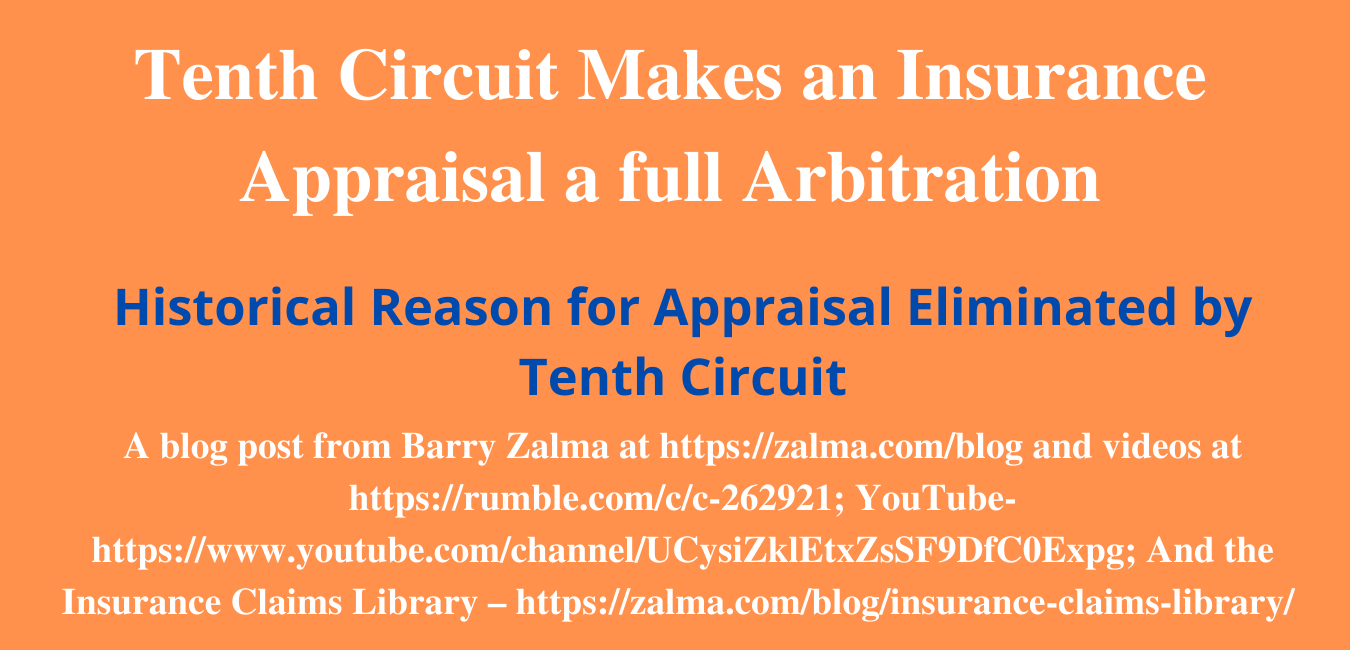Tenth Circuit Makes an Insurance Appraisal a full Arbitration

Historical Reason for Appraisal Eliminated by Tenth Circuit
Read the full article at https://www.linkedin.com/pulse/tenth-circuit-makes-insurance-appraisal-full-barry-zalma-esq-cfe and at https://zalma.com/blog plus more than 3900 posts.
Bonbeck Parker, LLC and BonBeck HL, LC (collectively, BonBeck) claimed from Travelers benefits they claimed were due to hail damage. The Travelers Indemnity Company of America (Travelers) acknowledged that some of the claimed damage to BonBeck’s property was caused by a covered hailstorm but argued that the remaining damage was caused by uncovered events such as wear and tear. BonBeck requested an appraisal to determine how much damage occurred, but Travelers refused this request unless BonBeck agreed that the appraisers would not decide whether the hailstorm in fact caused the disputed damage. When BonBeck rejected this condition, Travelers sued in Bonbeck Parker, LLC; Bonbeck HL, LLC v. The Travelers Indemnity Company Of America, No. 20-1192, United States Court of Appeals, Tenth Circuit (October 1, 2021) seeking a declaratory judgment that the appraisal procedure in BonBeck’s policy does not allow appraisers to decide the causation issue. The district court disagreed, ruling that the relevant policy language allowed appraisers to decide causation. After the appraisal occurred, the district court granted summary judgment to BonBeck on its breach of contract counterclaim, concluding that Travelers breached the policy’s appraisal provision. Travelers appealed..
ZALMA OPINION
In my book, Zalma on Insurance Claims Part 104 Third Edition I note that appraisal, since the inception of the Standard Fire Insurance Policy, has been limited to a determination of the quantum of the loss. Determining causation required either an agreement of the insured and the insurer or a court judgment. By taking the quantum of loss away by appraisal all litigation disputing coverage would be limited to a trial or agreement on the cause of the loss. The Tenth Circuit has eliminated this process and allows appraisers to determine both causation and amount of loss and if the cause is one not excluded the entire dispute is resolved. Appraisal is a special form of limited arbitration, there are significant differences between the powers of an arbitrator and those of an appraiser. An arbitrator’s role is more like that of a judge in a judicial proceeding. In Florida, it is clear that “whether the claim is covered by the policy is a judicial question, not a question for the appraisers.” [Gonzalez v. State Farm, 805 So.2d 814, 2000.FL.0049845 (2000)] The Tenth Circuit should reconsider its conclusion and consider the meaning of the language rather than apply a dictionary definition to resolve an issue of law.
We are 100% funded for October.
Thanks to everyone who helped out. 🥰
Xephula monthly operating expenses for 2024 - Server: $143/month - Backup Software: $6/month - Object Storage: $6/month - SMTP Service: $10/month - Stripe Processing Fees: ~$10/month - Total: $175/month
- Art
- Causes
- Crafts
- Crime
- Dance
- Drinks
- Film
- Finance
- Fitness
- Food
- Spiele
- Gardening
- Health
- Home
- Literature
- Music
- Networking
- Paranormal
- Other
- Politics
- Verzeichnis
- News
- Party
- Science
- Religion
- Shopping
- Sports
- SyFy
- Politically Incorrect
- Philosophy
- Theater
- Technology
- Wellness



